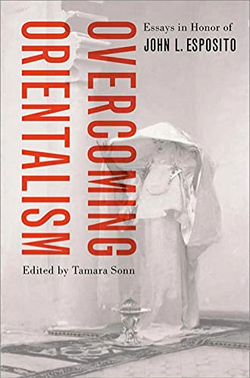Website buku.

Di permukaan, Festschrift atau kumpulan esai penghormatan ini sama-sama lazimnya dengan reputasinya. Para mahasiswa, kolega dan pers sebuah universitas terkemuka memuja-muji seorang cendekiawan yang sangat produktif menulis dan berpengaruh ketika dia mencapai ulang tahunnya yang ke-80 dengan sejumlah besar esai asli yang terkait dengan minatnya seumur hidupnya.
Tetapi lihatlah lebih sungguh lagi dan bangunan rumit kumpulan esai (apparatus) itu pun hancur berkeping. Judul menyinggung penipuan intelektual terbesar generasi ini. Menyinggung klaim bahwa para cendekiawan Barat yang ahli dalam masalah Timur Tengah berperan sebagai roda penggerak dalam mesin imperialis. Sang cendekiawan kenamaan pun karena itu menulis lusinan buku yang meminta maaf atas ideologi totaliter, Islamisme, sambil membuka sebuah pusat akademik yang didanai oleh dan dinamai sesuai dengan nama pendukung terkenal ideologi yang sama. Editor buku pun senang dengan jabatan universitas tempatnya bekerja yang diberi nama sesuai dengan nama salah satu pemimpin politik paling aktif yang mempromosikan ideologi yang sama.
Dengan kata lain, buku Overcoming Orientalism menghadirkan satu roda penggerak (seolah-olah memang demikian) dalam penipuan terbesar dunia kecendekiawanan Amerika pasca-1978. Dunia kecendekiawan yang sudah rusak tujuannya, yang curang gagasannya sekaligus sangat beracun dampaknya. Daripada memperdebatkan poin pemikiran ini untuk kedua belas esai itu, mari kita memusatkan perhatian pada bab contoh ini. Judulnya, "How Islamic Is ISIS" (Seberapa Islamikah ISIS itu) yang ditulis oleh Soheil H. Hashmi, dosen Hubungan Internasional di Alumnae Foundation dan dosen Ilmu Politik di Mount Holyoke College.
Sekarang, semua orang yang hidup selama masa kejayaan ISIS tahun 2014 sadari bahwa organisasi yang mengadopsi praktik-praktik Islam ekstrem itu tersebut, menerapkan Hukum Syariah abad pertengahan secara mendetail kemudian berusaha memperluas kekhalifahannya ke seluruh dunia. Beberapa ahli, seperti Graeme Wood dan penulis resensi esai ini, pun sudah secara rinci menjelaskan argumen ini. Tetapi Hashmi, seperti mereka katakan, tidak memperhatikan catatab itu. Baginya, melihat ISIS sebagai Islamiah itu "aneh." Dalam pandangannya, "ISIS itu pertama-tama dan terutama adalah sebuah aliran sesat. Bukan gerakan sosial. Bukan gerakan reformasi. Bukan pula kelompok pengacau atau pemberontak." ISIS menurutnya, "menempatkan dirinya jauh di luar" "konsensus interpretatif yang luas" tentang Islam.
Supaya tidak dianggap bahwa pemikiran ini hilang tidak jelas, perlu diingat bahwa sejumlah pemimpin politik penting menggemakan omong kosong ini. Omong kosong bahwa ISIS "tidak Islami." Para pemimpin politik yang termasuk di dalamnya adalah Tony Blair dan Barack Obama. Pemikiran ini mengarah pada kebijakan yang salah, penghancuran properti dan kembali hidupnya perbudakan dan banyak kematian.
Begitulah warisan John L. Esposito, yang diabadikan oleh galeri cendekiawan palsu yang jahat (rogue) ini.
Topik Terkait: Akademia, Islam, Islam Radikal
receive the latest by email: subscribe to daniel pipes' free mailing list
The above text may be cited; it may also be reposted or forwarded so long as it is presented as an integral whole with complete information provided about its author, date, place of publication, and original URL.
On the surface, this Festschrift is as conventional as it is reputable. Students, colleagues, and a prominent university press celebrate a prolific and influential scholar on reaching his 80th birthday with a substantial tome of original essays related to his lifelong interest.
But look harder and the apparatus shatters. The title alludes to the greatest intellectual scam of the generation – the claim that Western scholars of the Middle East served as cogs in imperialist machines. The feted scholar has written dozens of books apologizing for a totalitarian ideology, Islamism, while opening an academic center funded by and named after a notorious advocate of that same ideology. The book's editor revels in a university position named after one of the most active political leaders promoting that same ideology.
In other words, Overcoming Orientalism represents one cog (as it were) in the great deceit of post-1978 American scholarship, corrupt in its purposes, fraudulent in its ideas, and toxic in its impact. Rather than argue this point for all twelve essays, let us concentrate on a sample chapter, "How Islamic Is ISIS" by Soheil H. Hashmi, professor of International Relations on the Alumnae Foundation and professor of Politics at Mount Holyoke College.
Now, everyone sentient during the ISIS heyday of 2014 knew that the organization adopted extreme Islamic practices, implemented Shar'i law in medieval detail, and sought to expand its caliphate to the entire globe. Some specialists, such as Graeme Wood and this reviewer, expounded on this argument. But Hashmi, as they say, missed the memo. For him, seeing ISIS as Islamic is "grotesque." In his view, "ISIS is first and foremost a cult. It is not a social movement, nor a reform movement, nor a group of insurgents or rebels." It "placed itself well outside" of the "broad interpretive consensus" on Islam.
Lest it be thought that this line of thinking sank harmlessly into obscurity, it bears remembering that a host of important political leaders, including Tony Blair and Barack Obama, echoed this nonsense that ISIS "is not Islamic," leading to erroneous policies, the destruction of property, the revival of slavery, and much death.
Such is the legacy of John L. Esposito, perpetuated by this rogue's gallery of sham scholars.

